Prepare to See More Spiders in Your Home Soon, Science Says
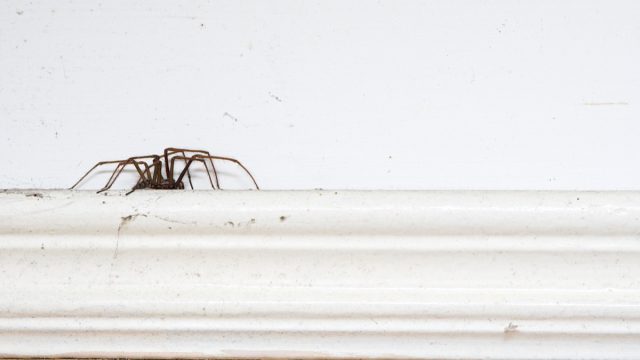
Finding a spider in your house isn’t exactly a pleasant experience, especially if you notice one dangling from a light fixture or while you’re taking a shower. But despite their sometimes scary appearance, spiders are actually helpful to have at home, as they act as natural pest control. These creatures feed on pesky insects like mosquitoes, flies, and even cockroaches. Regardless of your stance on spiders, however, you should be prepared to see more of them in your house as spider season approaches. Read on to find out the scientific reason you’ll be soon be seeing more spiders in your space.
READ THIS NEXT: If You Live Here, Watch Out for This Poisonous Spider in Your Home.
Spiders are attracted to different things in your home.
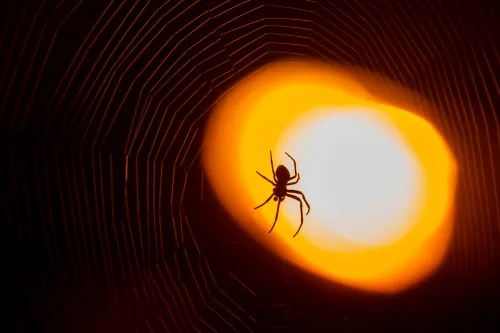
If you’re not interested in having an eight-legged houseguest, you might want to reconsider some decorative aspects of your home. Spiders are more inclined to set up shop in your yard if you have bright lighting on your home’s exterior.
Inside, they especially like cozying up in houseplants. Your ficuses and fig trees offer a perfect spot for spiders, as houseplants often go untouched for long periods of time. Plants are especially enticing if you don’t regularly preen and prune, as more leaves create more convenient hiding places.
But aside from these attractive aspects, there’s something out of your control that also affects your home’s spider population.
Mating season has begun.
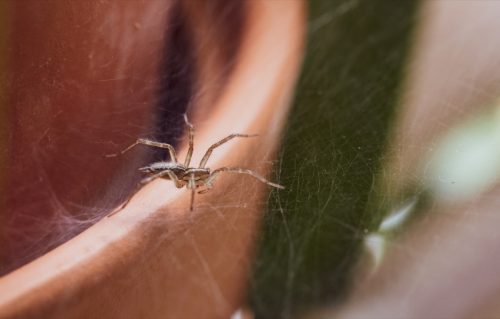
With summer’s exit and the arrival of fall, you’re more likely to see spiders in your home, as the creatures are entering mating season.
According to a blog post from the Burke Museum, a Smithsonian Affiliate, you’ll see more spiders during late summer, as males are on the hunt for for a female to mate with. Female spiders are going to stay put with their webs, so those that you notice trekking across your home are just looking for a date.
“Females give off a chemical called a pheromone, a kind of perfume, which the males can sense with special hairs on their legs. The wandering males are basically sniffing around for a mature female,” Jason Dunlop, researcher from the Museum für Naturkunde in Berlin, Germany, told USA Today.
RELATED: For more up-to-date information, sign up for our daily newsletter.
These spiders aren’t new additions to your home.
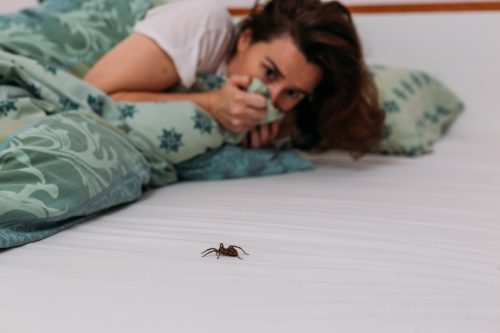
There’s a common misconception that spiders make their way into your home to flee from the cold when temperatures drop outside, but according to the Burke Museum, this just isn’t the case.
“Spiders are ‘cold-blooded’ and not attracted to warmth,” the museum’s blog post reads. “They don’t shiver or get uncomfortable when it’s cold, they just become less active and eventually, dormant.”
In fact, house spiders—meaning those you see in your home—are a different species from those you see outside. Experts estimate that less than 5 percent of spiders you see inside have ever seen the outside world, and if outdoor varieties do somehow end up in your home, they either die or fail to reproduce. So, whether you like it or not, the spiders you’re now noticing have already been calling your home their own.
“There’s this misguided perception that all of a sudden there are many more spiders than there used to be but, you know, that’s not the case. They’re just more noticeable because the males are moving around,” Anne Danielson-Francois, PhD, associate professor of biological sciences at the University of Michigan-Dearborn, tells USA Today.
Male spiders have also matured over the course of the summer months, according to Adam’s Pest Control, Inc., and they’re generally harder to miss when fully grown.
Experts ask that you resist the urge to kill spiders.
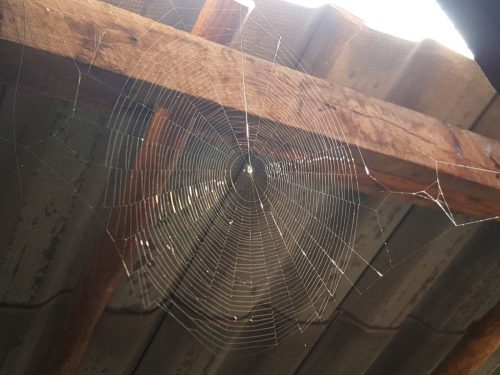
If you do see spiders in your house, you might be inclined to squash them on sight. But experts ask that you curb this instinct, and instead get rid of their webs if you come across them. By doing so, spiders are more likely to retreat to spots you don’t frequent as often, like crawl spaces and wall voids, per Adam’s Pest Control.
Evicting all arachnids from the premises requires a professional, and you’ll need to enlist a pest specialist in that case. But experts also say that most of these house spiders are harmless, even though they can be scary to stumble upon.
“I advocate for people getting to know them, and becoming less afraid of them and keeping them around, but I realize that’s a stretch,” Danielson-Francois told USA Today.